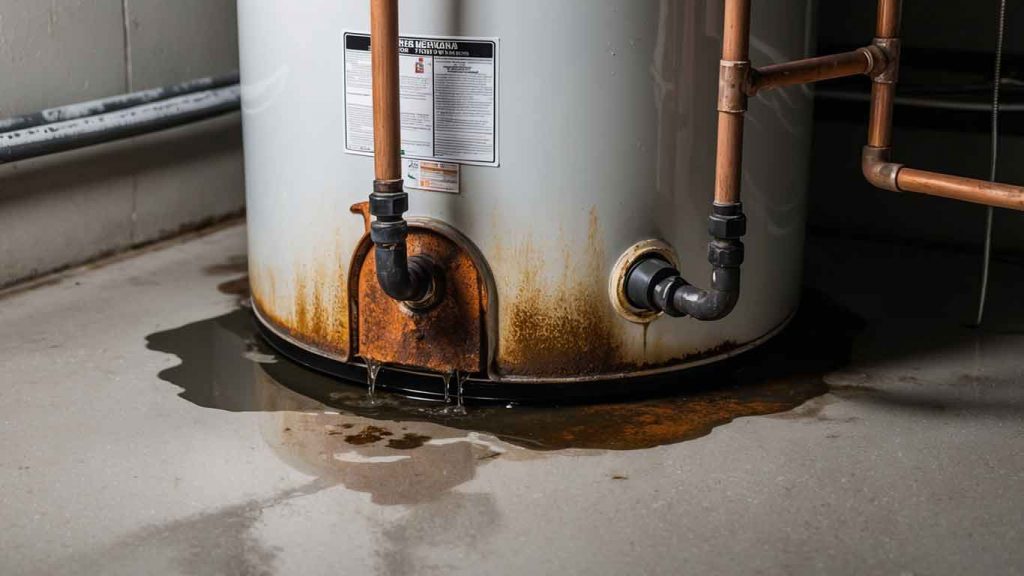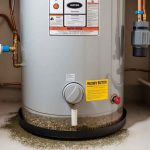Water Heater Corrosion: Signs, Causes, and How to Fix It

If your water heater produces rusty water or makes odd noises, corrosion could be the culprit. This silent issue slowly damages the internal parts of your heater, leading to leaks, inefficiency, and unexpected breakdowns. The inconvenience of a failing water heater can disrupt your routine and cause unnecessary stress, but there’s a way to get ahead of it. By recognizing the signs of corrosion early and understanding its causes, you can take steps to fix the problem and keep your water heater running smoothly for years to come.
Let’s dive into what you need to know to protect your system from corrosion.
Signs of Water Heater Corrosion
Rusty Water
One of the most noticeable signs of corrosion is when the hot water appears rusty or discolored. This indicates that the inside of your water heater tank or the pipes connected may be corroding and releasing rust into your water supply.
Unusual Noises
If you hear popping, cracking, or rumbling sounds from your water heater, it could indicate that sediment and corrosion have built up inside the tank. These noises result from hardened minerals reacting with the tank’s inner lining.
Leaks or Moisture Around the Tank
Corrosion weakens the tank’s structure, leading to leaks around the base or even dripping water from valves and pipes. If left unchecked, even minor leaks can lead to bigger problems.
Decreased Hot Water Supply
A corroded water heater may struggle to heat water efficiently, leading to a noticeable drop in hot water availability. If your showers are getting shorter or the water isn’t as hot as it used to be, corrosion could affect the tank’s performance.
Common Causes of Water Heater Corrosion
Sediment Buildup
Over time, minerals in the water can accumulate inside the tank. This sediment settles at the bottom, creating an environment where corrosion can thrive and weaken the tank’s structure.
Anode Rod Failure
The anode rod in your water heater is designed to attract corrosive elements and prevent them from attacking the tank. When the rod wears out, the tank becomes vulnerable to corrosion.
High Water Acidity
Water with high acidity levels can accelerate the corrosion process, particularly in areas with naturally acidic water. This can cause the metal in your tank to corrode faster than normal.
Oxygen in the Water
When water is exposed to oxygen, it creates the perfect conditions for rust and corrosion to form. Over time, this can eat away at the heater’s internal components, leading to leaks and inefficiency.
Lack of Maintenance
Regular maintenance, such as flushing the tank and replacing the anode rod, helps prevent corrosion. Without this care, rust can develop unnoticed and spread throughout the system.
How to Fix and Prevent Water Heater Corrosion
Flush the Tank Regularly
Flushing your water heater tank at least once a year helps remove sediment buildup, reducing the risk of corrosion. Draining the tank and clearing out mineral deposits prevents them from settling and damaging the tank’s inner lining.
Replace the Anode Rod
The anode rod plays a crucial role in preventing corrosion. It attracts corrosive elements, protecting the tank. If the rod has worn down, it must be replaced promptly to safeguard the water heater from rust and corrosion.
Install a Water Softener
Hard water contains high levels of minerals, which can lead to sediment buildup and corrosion. Installing a water softener helps reduce these minerals, protecting your water heater from premature wear and damage.
Maintain the Correct pH Levels
If your water is too acidic, it can accelerate corrosion. Using a neutralizer or regularly checking the water’s pH can help maintain a balanced level, protecting the water heater’s interior from corrosion.
Schedule Routine Professional Inspections
Regular maintenance by a professional can catch early signs of corrosion before they lead to significant damage. A technician can inspect for any weak spots, replace worn-out components, and keep your water heater functioning optimally.
Use a Protective Coating
Some water heaters benefit from additional protective coatings or liners inside the tank to slow corrosion. If corrosion has already started, this can serve as an added layer of defense to extend the life of your heater.
When to Replace a Corroded Water Heater
Frequent Leaks
If your water heater is experiencing frequent leaks, it’s a strong indicator that corrosion has compromised the tank’s structure. Small leaks can be patched, but persistent leaks signal that the tank is nearing the end of its lifespan, and replacement is likely the best option.
Rusty Water Doesn’t Improve
If you continuously get rusty or discolored water even after flushing the tank, the corrosion may have progressed beyond repair. At this stage, replacing the water heater is often more cost-effective than trying to fix it.
Decreased Efficiency
A corroded water heater may struggle to heat water effectively, resulting in higher energy bills and less hot water. If your system isn’t heating as it used to, and repairs aren’t improving its performance, it may be time to replace it.
Old Age
Water heaters typically last between 8 to 12 years. If your unit is nearing or has surpassed this age and shows signs of corrosion, replacing it is often the safest and most economical decision.
Multiple Component Failures
When corrosion affects multiple parts, such as the tank, valves, and pipes, repairing each issue may not be cost-effective. In such cases, replacing the entire system ensures you avoid constant breakdowns and costly repairs.
Significant Structural Damage
If corrosion has led to severe structural damage, such as large rust spots, visible holes, or cracks in the tank, replacement is necessary. This level of damage indicates that the tank is no longer reliable or safe to use.
Protect Your Water Heater from Corrosion Today
By recognizing the signs of water heater corrosion and addressing the causes early, you can avoid costly repairs and extend the life of your system. Regular maintenance and timely repairs are key to running your water heater smoothly. If you suspect your water heater is rusted or showing signs of failure, don’t wait for the problem to worsen.
Call Gwinnett Plumber Pro at (706) 224-1385 for water heater services and prevent further damage to your system!


